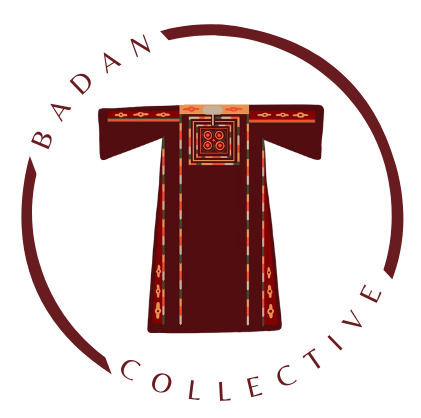The short answer is—yes! Everyone is welcome to practice and learn about tatreez. It is a powerful art form that can help us learn more about about the Palestinian people and their culture.
The long answer has a more to do with understanding the difference between appreciation and appropriation as well as understanding best practices for engaging with a craft that faces erasure. Let's break down what this all means, especially for non-Palestinians that are curious!
While practicing, wearing, or learning about tatreez, we recommend:
1) Acknowledging that tatreez has Palestinian origins and history.
This is so as not to add onto the ongoing erasure and ethnic cleansing of the Palestinian people, their culture, and their traditions.
2) Standing in solidarity with the Palestinian people.
Tatreez is political. There is no doubting this. Art and people cannot be separated. It's up to you, the person stitching or wearing tatreez, to be loud about your support for Palestine and the Palestinian people, especially when Palestinians call on you to do so.
3) Continuously educating yourself on the Palestinian cause and staying up-to-date on current news from credible sources.
This includes staying connected to first-hand accounts from Palestinians based in occupied Palestine or ones in the Gaza strip experiencing genocide.
This also includes seeking out long-form educational resources like lectures, classes, and reading books. Social media is a great place to start but it should not be the sole place you get information from.
4) Meeting and getting to know Palestinians.
If a Palestinian invites you into their safe space of a home, show up. Participate in our traditions with us, see us in our environments, hear our stories, show up in community, and help us advocate for our right to return to a free Palestine.
It is so rare that Palestinians can truly express themselves and be proud of their identities in safe environments. To us, this can be a sacred act. When you are invited to participate in our traditions, we are extending you an invitation to witness our existence. We are, in a way, engaging in a silent exchange with you. It is an unspoken agreement which states that if we are not able to carry the mantles of our own traditions into the future with us, we ask that you do.
We ask that you learn about us, our history, and our ability to thrive under unimaginable circumstances so that you can remind the world we existed, that we had the right to exist, and that we tried our best to exist in a world that didn't want us to.
Though this sacred exchange is one we will happily engage in with those that approach us, we hope one day that it will no longer be necessary.
5) Supporting tatreez artists.
When you come across a tatreez artist who is selling their designs, try your best to support and purchase from their shop! Encourage others to do so as well.
We do not recommend taking photos of their designs or stitching them without the artist's permission.
6) Learning the difference between appreciation and appropriation.
Under appreciation, we encourage folks to:
- Learn and expand one's knowledge on tatreez and its historical context.
- Stitch to preserve the tradition for future generations.
- Wear tatreez items while acknowledging their origins.
- Connect the art to its people.
- Support, advocate, and take action to aid in the liberation efforts of the Palestinian people, their land, and their arts.
Under appropriation, we encourage folks not to:
- Claim tatreez has no Palestinian origins, therefore adding onto the erasure of the craft.
- Wear tatreez and not acknowledge its origins.
- Disconnect the art from its people, i.e. stitch tatreez and ignore the Palestinian people's cause.
- Stitch tatreez artists’ work without their permission.
- Sell tatreez artists’ designs without their consent.
- Exploit, intentionally or otherwise, the Palestinian culture for profit, marketing, fundraising, sales, growth on social media platforms, or similar activities.
Overall, the most important recommendation is to approach tatreez with intention. Be aware of your interactions with this art and the Palestinian people. If you are already doing so, we'd say you're on the right track.
If you have stood firmly in solidarity with us these last few months,
We see and appreciate you. We feel safe around you. We welcome you. We thank you for standing loudly and proudly with us when we need it most.
If you have been silent these past few months,
We do not want you to participate in our arts –tatreez, dance, food, clothing– if you cannot stand loudly and firmly with us when our people are being ethnically cleansed.
Thank you for taking the time to read this post and to be intentional! We look forward to seeing you at future stitching circles and to learning more about tatreez with us.


2 comments
Tatreez was brought to Lebanon by Palestinian Refugees. There may have been other types of embroidery practiced in Lebanon and some people may have practiced cross stitch, but Palestinian Tatreez has its own motifs and practices that are unique to Palestine. Also, some Lebanese artists may have incorporated Tatreez into their art without an awareness of its significance to Palestinians. That does not make it Lebanese.
So we’re going to pretend tatreez is just Palestinian?